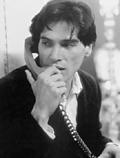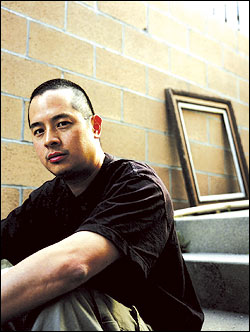LUMUMBA
directed by Raoul Peck with Eriq Ebouaney runs Aug. 17-23 at Varsity
THERE’S A CERTAIN stiffness about Lumumba, and it has to do with the movie’s framing device. Historical dramas tend to be stagy as a rule, but having a film about a slain political leader narrated from the beyond by the protagonist himself risks outright pompousness—especially when the narration is as pedantic as it is here.
Then again, who can blame Raoul Peck for wanting to go for magisterial sweep? This is an important subject—one that he visited before with the 1991 documentary Lumumba: Death of a Prophet. Patrice Lumumba became prime minister of Congo in 1960, and remains the first and only democratically elected leader in that country (which was called Zaire from 1965-97). Two months later, he was ousted from office; seven months after that, he was executed on orders from one-time compatriot Joseph Mobutu. Today, Lumumba’s all but unknown outside of Africa. This movie is Peck’s attempt to redress that situation.
Impressively, Peck conveys the complex set of actions that surrounded Lumumba’s rise and fall with relative ease and swiftness; you follow the story with little strain, a doubly impressive achievement for a dialogue-heavy movie in French with English subtitles. As Lumumba, Eriq Ebouaney is a riveting presence—so much so that I frequently found myself wondering if I was responding to his performance or just to the charisma of the actor himself. (If, for some reason, Spike Lee ever decides to remake Malcolm X in French, Ebouaney’s his man.) Lanky and impeccably groomed (when he’s not being tortured in prison for his political beliefs), Ebouaney conveys Lumumba’s righteous anger without a forced note, especially when giving speeches (particularly his seething rebuttal to a condescending farewell by King Baudouin, Congo’s departing Belgian ruler). In moments like these, Lumumba transcends its overriding stiffness and gives a real sense of what was—and to a large extent remains—at stake in Congo.








